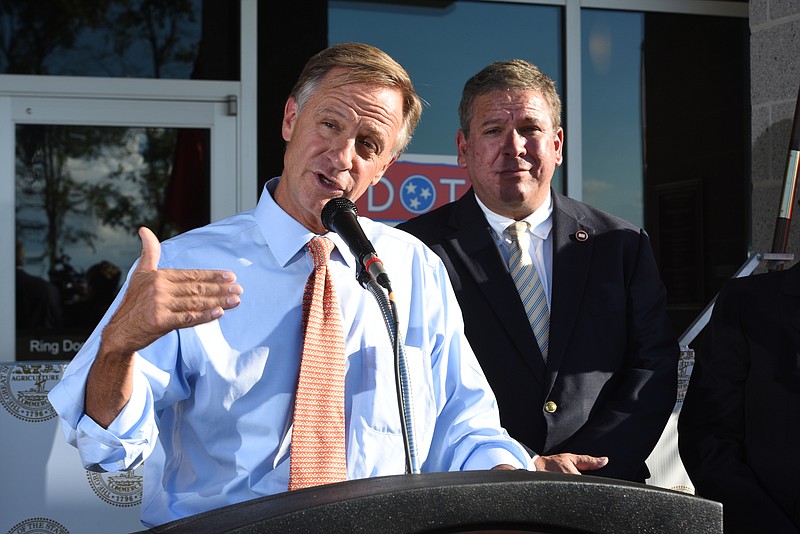It's time for a bit of tax equity and tax honesty.
Tennessee's Republican Gov. Bill Haslam is finding that as he seeks additional money for roads through proposed increases on fuel taxes, he's opening a conversation about tax fairness.
Haslam is pushing a bill to raise the tax on gas and diesel to help tackle a projected backlog of $10.5 billion in highway and bridge projects. But, with the state holding a $1.1 billion surplus in non-highway tax revenue that pays for general government functions like education and prisons, the governor also has proposed cutting three taxes by $270 million, including reducing the state's 5 percent sales tax on food by a half percentage point, or $55 million.

Herein lies the question of equity.
If you assume another $113 million in tax cuts aimed for manufacturers will generate jobs, you're still left with $102 million in cuts slated to benefit wealthy folks with investments - folks like those who pay the Hall income tax, which would be phased out at an increasingly rapid pace under Haslam's proposal.
The trouble is that poor and middle-class Tennesseans spend a significantly higher percentage of their incomes on food and gas than do the 175,000 wealthy Tennesseans who pay the Hall tax.
Tennessee already is consistently ranked among the states where poor and middle-class taxpayers pay the largest share of their income compared to wealthier individuals. On the other hand, Tennessee in some rankings has the third highest corporate tax burden, a fact that Haslam says will cause us to lose opportunity and jobs if we don't address it.
According to WalletHub, Tennessee's overall tax burden rate as a percent of income in 2015 already looked in favor of the wealthy. WalletHub said the Volunteer State's tax rate was 9.17 percent for the poor, with a ranking of 16. Middle income Tennesseans paid 7.02 percent of their incomes in taxes for a ranking of 6, while high income residents paid 4.97 percent of their income in taxes for a ranking of 4.
Further, the U.S. Federal Reserve issued a study of last year showing that Tennessee had the most regressive system of taxation in the country, "meaning that we put more obligations on our poorer residents than every other state," said state Sen. Jeff Yarbro, D-Nashville. Yarbro has proposed a bill that would reduce the state sales tax on diapers, some feminine toiletries, food and some over-the-counter drugs by half a percent annually until the tax is fully phased out on those items over the next decade. That full phase-out would cost the state about a half billion dollars annually.
"If we're going to address the tax code this year, we think that should be made fairer," Yarbro said.
Republicans, too, are looking for solutions.
"I don't see how you justify doing a gas tax increase unless there's at least a net even decrease for people that pay the increase - working and poor people," said state Rep. Gerald McCormick, R-Chattanooga, the former House majority leader who now heads the chamber's Budget Subcommittee. He said he favors deeper cuts in the state's sales tax on groceries.
Tennessee is one of several states with no general income tax, instead relying heavily on sales taxes to pay for government services. With a 9.25 percent combined state and local sales tax rate, Hamilton County residents pay a higher sales tax rate than most of the nation.
Haslam's proposed reduction would amount to a 50-cent break on $100 worth of groceries, while the proposed gas tax increase is expected to cost the average motorist about $4 a month, according to some state fiscal analysts. That means our the most vulnerable residents - the working poor and single mothers - are being stretched too thin.
"People who are poor are paying an enormous amount of taxes for basic human needs," said Mary Ellen Galloway, executive director of Family Promise of Greater Chattanooga. "We're balancing the budget on the backs of the poor."
As McCormick and Yarbro show, both parties in our state government understand that tax equity is important. It's how to achieve it that makes a tougher problem.
We understand that will take a sharp accounting pencil, but we believe fairness is a no-brainer. And we expect our leaders to be able to figure it out:
Zero the food tax first - and fast. Then if there's still a recurring surplus, continue as necessary the phase-out of the Hall investment tax.
